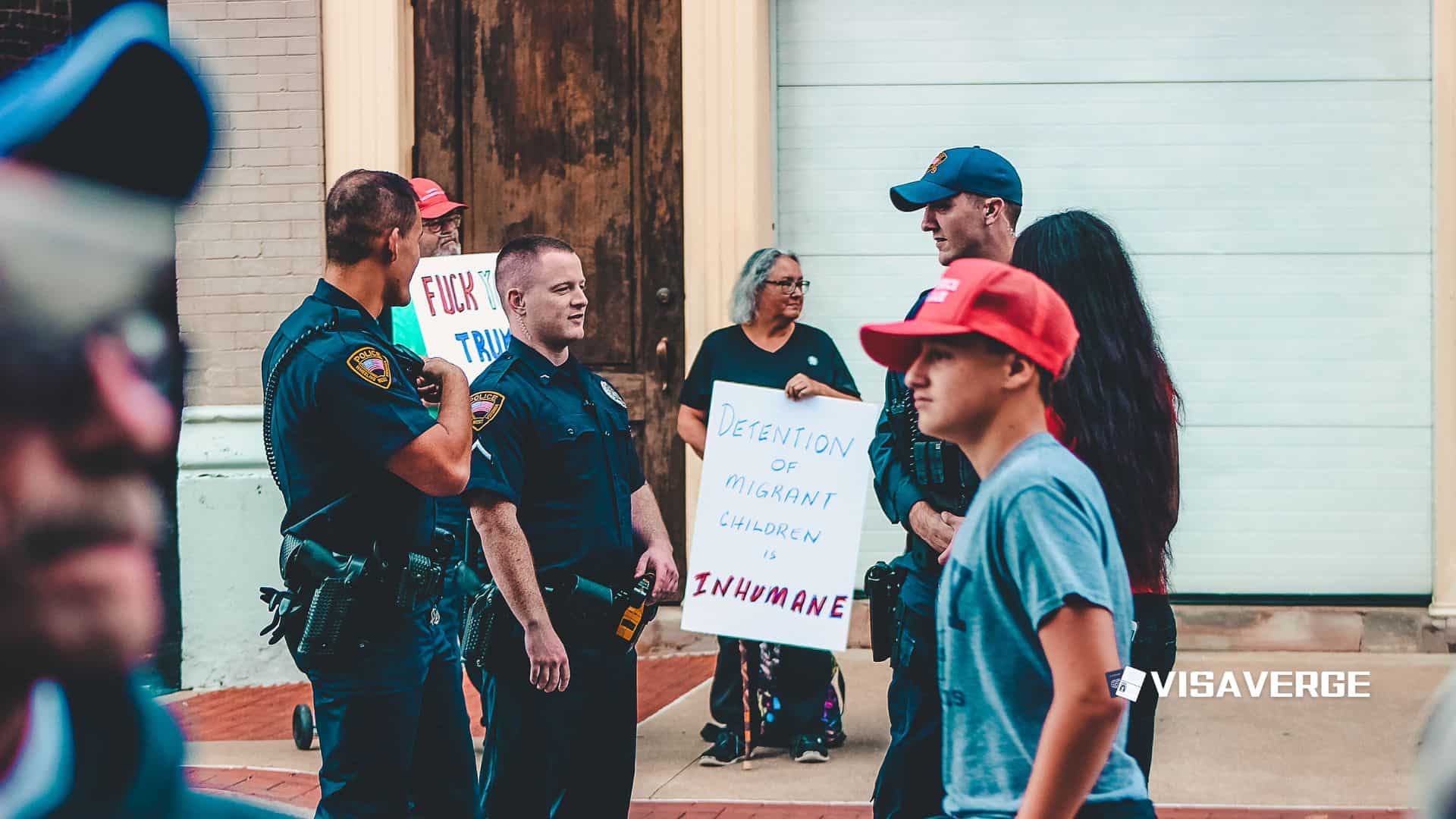About 120,000 Ukrainians who fled Russia’s war are poised to lose their legal foothold in the United States as the Uniting for Ukraine humanitarian parole program lapses without renewal. Starting on August 15, 2025, parole grants for those who arrived after August 16, 2023 began expiring on a rolling basis. The Trump administration has allowed the Biden-era program to lapse and has not put a replacement in place, despite President Trump saying in July that Ukrainians would be allowed to remain until the war ends. Without a new policy, families are slipping into legal limbo, risking job loss, loss of services, and possible deportation.
Launched in April 2022 under President Biden, Uniting for Ukraine offered two-year, renewable humanitarian parole to Ukrainians fleeing the invasion. The program opened a swift path to safety for hundreds of thousands, backed by U.S.-based sponsors. Now, as the two-year mark arrives for many later entrants, the absence of any extension means their parole—and with it, work permits based on that parole—is ending.

Affected Ukrainians report deep uncertainty about how to keep working, keep homes, and keep children in school while they seek another lawful status in the United States 🇺🇸.
Policy status and who remains protected
Officials estimate roughly 250,000 people entered under Uniting for Ukraine, but only those who came after August 16, 2023 are hit by the lapse. Many earlier arrivals are covered by other protections, most notably Temporary Protected Status (TPS).
Key TPS dates and protections:
– For Ukrainians who have kept continuous residence in the U.S. since August 16, 2023 and re-registered for TPS during January 17–March 18, 2025, TPS is valid through October 19, 2026.
– USCIS has automatically extended work permits (EADs) for TPS holders through April 19, 2026, allowing continued employment while TPS remains valid.
– Government guidance and deadlines are posted on USCIS’s TPS-Ukraine page: https://www.uscis.gov/humanitarian/temporary-protected-status/TPS-Ukraine
Immediate consequences as parole expires:
– Loss of protection from deportation for those whose parole ends.
– Loss of legal right to work for people who relied on parole-based employment authorization.
– Reduced access to some public benefits.
– Increased exposure to detention and removal by Immigration and Customs Enforcement (ICE).
Processing of other immigration applications resumed in June 2025 after a court order lifted an administrative pause, but heavy backlogs remain. Ukrainians trying to shift from lapsed parole into another status—TPS, asylum, or family-based pathways—face long waits and uncertain outcomes.
Other pressures:
– New parole-based work permits are now valid for only one year, and fees have increased, adding strain to households already facing housing and childcare costs.
– Employers who rely on these workers are preparing for disruptions as work authorization expires and cannot be renewed under parole.
Practical options and immediate steps
Immediate steps depend on each person’s history and paperwork. Legal experts stress these basics aligned with current agency guidance:
- Check TPS status and re-registration
- Verify whether you hold TPS and whether you re-registered by March 18, 2025.
- If re-registered, TPS remains valid through October 19, 2026, with EADs auto-extended to April 19, 2026.
- Missed TPS re-registration?
- Late filing may be possible if you can show good cause. Advocate groups advise submitting the request as soon as possible to reduce the window without protection.
- Explore alternative pathways
- If you do not qualify for TPS, consider asylum or family-based pathways.
- Be aware that filing sooner does not guarantee success, but it can preserve options while policies remain in flux.
- Seek legal counsel
- Organizations and accredited providers report fast-changing rules and recommend individual screenings to avoid errors that can trigger enforcement.
Bullet-point summary of what to do now:
– Confirm TPS and EAD status.
– Save all USCIS notices and proof of residence.
– Submit late TPS requests immediately if you have good cause.
– File other immigration applications where eligible.
– Contact accredited legal providers or community clinics for assistance.
Enforcement climate and practical impacts
Advocacy groups warn the lapse will hit housing, health care access, and job stability. Specific impacts include:
– People who lose work authorization may struggle to pay rent and keep health insurance.
– Employers may cut hours or terminate employees when authorization expires.
– Children could face school moves if families must relocate.
– Application backlogs and higher fees are creating a cascading crisis for families who believed they would be protected as long as the war continues.
On enforcement:
– Individuals without valid status can face ICE actions, including detention and removal.
– Rights groups remind Ukrainians that everyone in the U.S. has certain constitutional rights, regardless of immigration status.
– Recommended precautions:
– Carry copies of key documents.
– Know how to contact counsel.
– Avoid signing papers you do not understand.
– Use community hotlines and clinics for status questions and help with filings.
Policy inconsistencies and political context
The administration’s statements and actions differ. In July, President Trump said Ukrainians fleeing the war would be allowed to stay until the conflict ends, but no policy mechanism has been announced to implement that promise. As a result, parole is expiring now with no bridge to keep people lawfully present.
Advocacy response:
– Groups have asked Congress to pass a targeted fix or to direct the administration to extend humanitarian protections.
– To date, no bill has passed, and there is no new parole program or extension in place.
Policy evolution and risks:
– From 2022 to 2024, Uniting for Ukraine enabled rapid, sponsor-based entries with two-year parole and renewal possibilities.
– In 2025, the Trump administration suspended new grants and let the program lapse for later entrants; the government is no longer taking new U4U applications.
– Advocates warn further limits on other parole programs could follow, depending on future court rulings and policy choices.
Human stories and community response
The policy changes translate into everyday strain for families. Example:
– A software tester who arrived in September 2023 found a sponsor and began working. With parole ending this fall and TPS unavailable due to missed re-registration, the worker faces a ticking clock on paychecks and health insurance while seeking legal help. Landlords, school staff, and employers are all affected as documents expire.
Community support and guidance:
– Several groups—including the Ukraine Immigration Task Force, ASAP Together, and CWS Global—are sharing plain-language updates and holding virtual clinics.
– Common advice:
– Keep proof of residence and identity current.
– Save all USCIS notices.
– Watch for any official announcements.
– Avoid rumors on social media; verify information through trusted community sources.
What could happen next
Possible actions by Washington:
– The administration could introduce a new protection pathway, propose narrow fixes, or offer time-limited relief while the war continues.
– Congress could act, but the timetable is uncertain.
Current reality:
– The lapse has created a rolling cutoff: every day more people reach their parole end date and lose protection, pushing the tally toward roughly 120,000 Ukrainians now at immediate risk.
Key takeaway: With timelines compressing, affected families should focus on actionable steps they can control—checking TPS status, filing where eligible, and securing legal counsel—while waiting for clear policy direction from Washington.
This Article in a Nutshell
Beginning August 15, 2025, about 120,000 Ukrainians who entered after August 16, 2023 face expiring Uniting for Ukraine parole, losing work authorization and deportation protection. TPS re-registrants retain status through October 19, 2026 with EADs extended to April 19, 2026. Legal counsel and rapid filings are crucial now.








